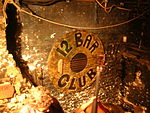Finsbury division
History of local government in London (pre-1855)History of the London Borough of BarnetHistory of the London Borough of HackneyHistory of the London Borough of HaringeyHistory of the London Borough of Islington ... and 1 more
Hundreds and divisions of Middlesex
The Finsbury Division was one of four divisions of the Hundred of Ossulstone, in the historic county of Middlesex, England. The area of the Finsbury Division is now the core of modern north London. The other divisions were named Holborn, Kensington and Tower. Ossulstone hundred was divided in the seventeenth century, with each of the four divisions replacing the hundred for most administrative purposes.
Excerpt from the Wikipedia article Finsbury division (License: CC BY-SA 3.0, Authors).Finsbury division
Palmer Place, London Lower Holloway (London Borough of Islington)
Geographical coordinates (GPS) Address Nearby Places Show on map
Geographical coordinates (GPS)
| Latitude | Longitude |
|---|---|
| N 51.55 ° | E -0.11 ° |
Address
Islington Central Methodist Church
Palmer Place
N7 8DH London, Lower Holloway (London Borough of Islington)
England, United Kingdom
Open on Google Maps







